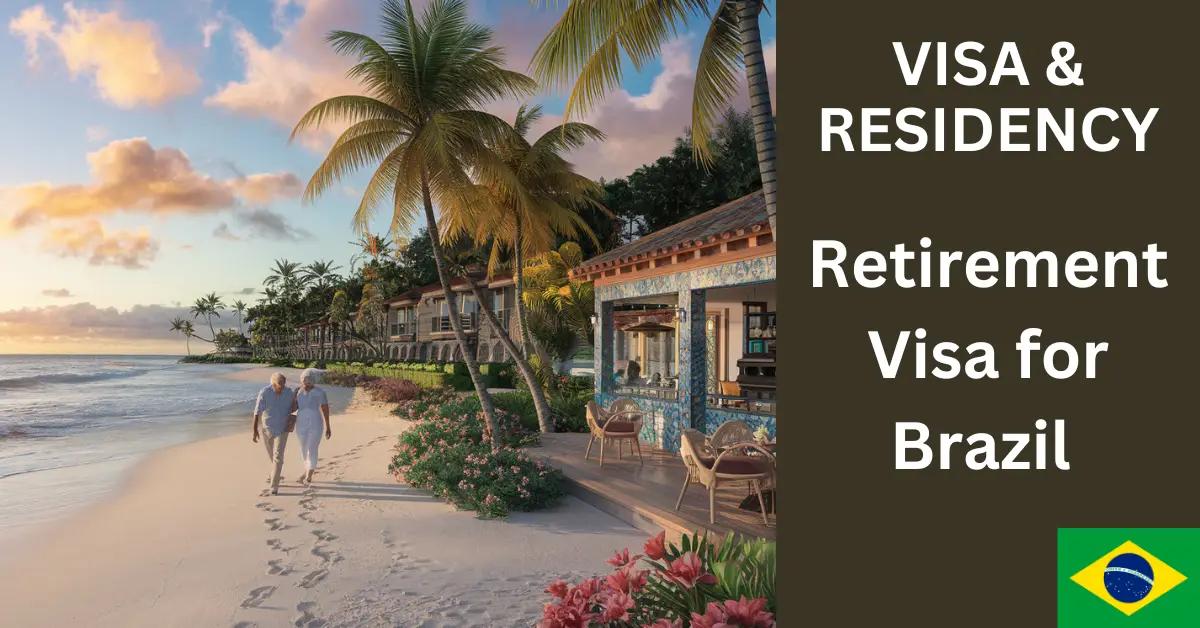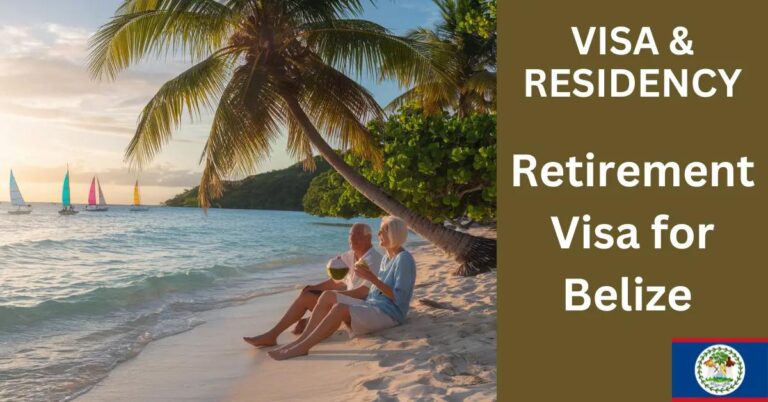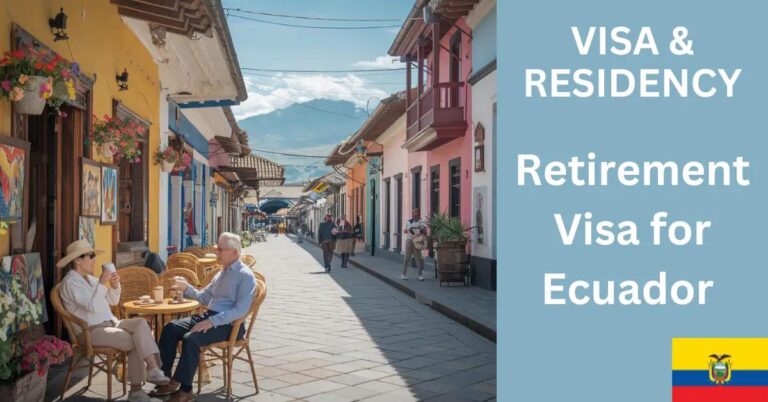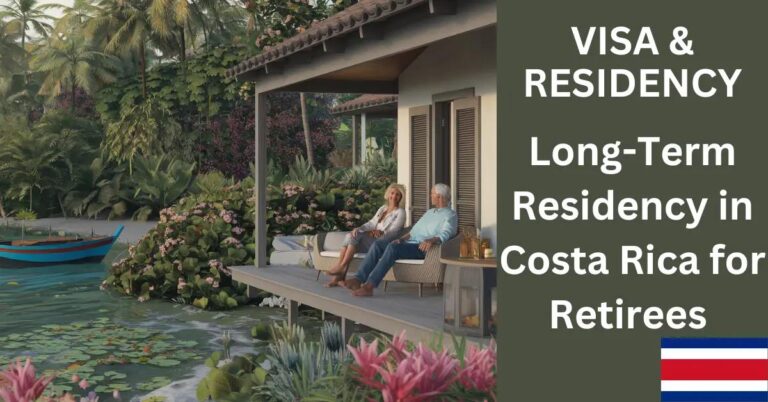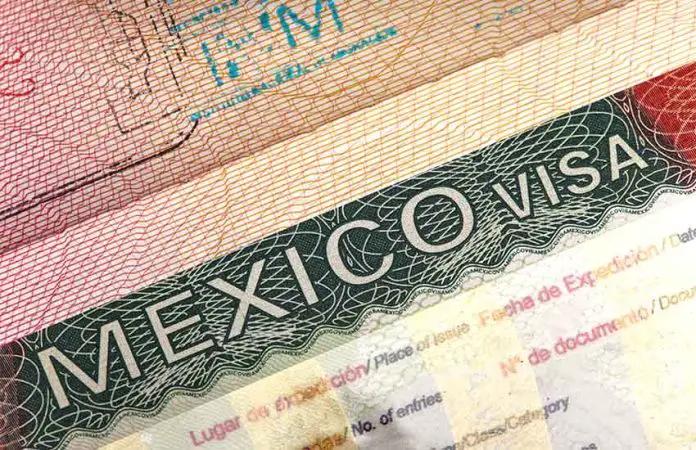TL;DR:
- Brazil's retirement visa requires applicants to be at least 60 years old and show a monthly income of $2,000 USD.
- Essential documents include a valid passport, bank statements, a clean police background check, and a health certificate.
- Apply via a Brazilian Consulate; expect fees around $200 USD.
- Retirees enjoy cultural opportunities, affordable living, and access to public and private healthcare.
- U.S. retirees can receive social security in Brazil.
- Popular retirement cities include Rio de Janeiro, São Paulo, and Florianópolis, but safety and cost vary.
- Brazilian healthcare offers public (SUS) and private options; private care is pricier.
- Learning Portuguese and understanding local infrastructure are key for adaptation.
- A comfortable retirement may require $1,200 to $2,000 USD monthly.
Dreaming of kicking back in Brazil after a lifetime of hard work? Understanding the requirements for a retirement visa is your first step. This guide simplifies the process, covering financial criteria, necessary documents, and the application steps. And let's not overlook Brazil's stunning landscapes, friendly culture, and affordable living, making it a top choice for retirees. Ready to explore this vibrant retirement haven? Here's everything you need to know to make it happen.
What are the requirements for a retirement visa in Brazil?
Wondering how to get a retirement visa in Brazil? First, you must meet age and financial prerequisites. You should be at least 60 years old to qualify. Next, let's talk about the financial requirements for a Brazil retirement visa. You must show a regular income of at least $2,000 USD per month. This assures the government that you can support yourself.
Got the money part sorted? Great, now let's discuss the documents you need. Start with a valid passport, which is essential. You'll also need bank statements to prove your financial status. Another critical document is a background check from the police, showing a clean criminal record. Lastly, attach a health certificate to prove you're in good shape.
Now, let's address the cost and process of your application. Arrange the documents and go to the nearest Brazilian Consulate or Embassy. They will guide you through the next steps. Be prepared for some expenses along the way, like application fees. Though costs can vary, they're usually around $200 USD or more.
Understanding how to apply for a retirement visa in Brazil is crucial. First, download and fill out the specific form from the Brazilian consulate's website. Next, submit your form along with all required documents in person. After submission, you'll wait for processing and approval.
Retirement visa for Brazil from the USA follows these same steps. Just head to a Brazilian consulate in the United States for details. In case you’re puzzled about any step, contact the consulate directly. They’re there to make your dream of retiring in Brazil a breeze.
Now, confidently gather the required documents for a Brazilian retirement visa. Ensure everything is complete and current. This process, though straightforward, requires diligence. With these steps and tips, you’re all set to start your retirement adventure in Brazil.
What Benefits Do Retirees Enjoy in Brazil?
You might overlook the hidden charms of living in Brazil as a retiree. The benefits of retiring in Brazil, however, expand beyond its sunny climate. So, what are the pros and cons of retiring in Brazil? Let me take you through it all.
You’ll find an abundance of cultural and recreational opportunities. Brazil invites you to festivals and samba, not to mention its stunning beaches. Imagine flexing your dance moves or relaxing on fine sands. The vibrant life here surely tops the list of retiree perks in Brazil.
Also, consider the cost of living advantages. Many find Brazil affordable compared to Western countries. Housing, food, and transport costs surprisingly fit within a moderate retiree budget. The value you capture living in Brazil as a retiree can allow more adventures or hobbies.
Now, ask yourself: Can I collect social security and live in Brazil? The answer is yes, you can. U.S. citizens can receive social security payments while enjoying their time in Brazil. This makes financial planning less of a worry for you. Your security benefits remain a dependable income stream.
Healthcare stands as a pillar of Brazil retirement residency benefits. Retirees access public healthcare, known locally as SUS (Sistema Único de Saúde), and private options. Healthcare facilities in urban regions generally meet good standards and are quite accessible.
Let us talk legal rights and residency benefits briefly. As a retiree, you gain specific residency rights in Brazil. These rights ensure you enjoy benefits linked to Brazil retirement residency status without stress. Retirees receive a permanent visa based on their income source, making living abroad more straightforward.
The blend of cultural richness, favorable cost of living, healthcare access, and secure finances makes Brazil a winner for retirees seeking a life full of new experiences. Aspects such as these can shape a fulfilling retirement in a country that truly has it all.
Where are the Best Places to Retire in Brazil?
Deciding on the best place to retire in Brazil involves careful consideration. Popular cities with expat communities might be a good start. Places like Rio de Janeiro, São Paulo, and Florianópolis have thriving international communities. These cities offer diverse cultural experiences and social opportunities. They have lively activities, entertainment, and the chance to meet other retirees.
When considering Brazil's best retirement destinations, think about living conditions and amenities. Big cities like Rio de Janeiro and São Paulo boast advanced infrastructure. You will find modern hospitals, efficient public transport, and plenty of leisure activities. Yet, these cities can be expensive and busy. For quieter surroundings, consider smaller cities like Natal or Fortaleza. These places have friendly locals and affordable lifestyles without the hustle.
Safety is another big factor when choosing where to live. Cities have different safety levels, though many offer secure neighborhoods. Rio has charming spots like Leblon and Ipanema, but some parts can be less safe. It's wise to research and talk with current residents. Florianópolis often ranks high in safety and quality of life for retirees.
Proximity to cultural attractions and nature varies by location. Rio de Janeiro offers dramatic views of mountains and beaches. It’s an excellent choice for enjoying nature and vibrant festivities. São Paulo is rich in museums and theaters, perfect for culture lovers. On the other hand, places like Recife provide stunning coastlines and historical sites.
Brazil offers diverse living options for retirees seeking new adventures. A mix of vibrant culture, modern amenities, and natural beauty awaits. By understanding each location's pros and cons, you can decide the best fit for your retirement lifestyle. Always consider safety, living conditions, and personal preferences. Talk to current expats and visit potential cities if possible. This helps ensure your Brazilian retirement meets all your dreams and needs.
How Does Healthcare Work for Retirees in Brazil?
Healthcare for retirees in Brazil seems complex at first. Brazil offers both public and private healthcare systems. Public healthcare, known as SUS, is free but crowded. It covers most common medical treatments. On the other hand, private healthcare is quicker and offers more options. But it is costly. Many retirees consider private healthcare for better services.
How much does retirement visa for Brazil cost? A retirement visa typically requires proof of income and financial stability. The costs relate to managing your financial documentation. But when considering healthcare, you must budget for insurance and medical costs, especially if choosing private plans.
What are the pros and cons of retiring in Brazil? One pro is the access to diverse healthcare options. However, the con is that private healthcare can be expensive. Quality varies greatly between public and private facilities.
To manage healthcare needs in Brazil as a retiree, planning is key. Retirees should research and choose between public and private services. It depends on your medical needs and budget. Many choose a combination—using public healthcare for basic needs and private insurance for more serious issues.
Long-term health insurance is vital for retirees. This insurance covers more specialized treatments and quicker service. Some companies offer packages for retirees, which can be more affordable. It's wise to compare different insurers to find the best deals tailored to your health.
Arrange healthcare before you move in order to have peace of mind. Gather records and a list of your medications. It's also a good idea to find local doctors and clinics near your new home.
In Brazil, healthcare gives retirees a lot of choices. With proper planning, retirees can enjoy quality medical care. Balancing public and private options helps manage costs while ensuring good treatment. Always have a plan for healthcare to live comfortably in Brazil.
What Lifestyle Adjustments Should Retirees Expect in Brazil?
Retiring in Brazil means adjusting to many new experiences and challenges. Let's first tackle climate considerations. Brazil's climate varies greatly, from the hot and humid Amazon to the mild and chilly south. This diversity can affect where you choose to live based on your comfort with different weather patterns.
One crucial aspect of moving to Brazil is the language barrier. Portuguese is the official language. To truly enjoy living in Brazil, learning Portuguese is key. It will help you make friends, understand the culture, and navigate everyday life with ease. Even just knowing basic phrases can make a big difference in feeling at home.
Cultural adaptation is another important part of retiring in Brazil. Brazil has a rich, vibrant culture with lively festivals, music, and food. Embrace these new cultural experiences as part of your retirement journey. Integration can bring you closer to locals, enriching your experience in this vibrant country.
When it comes to retirement lifestyle preferences, consider the pros and cons. Pros include a laid-back lifestyle and friendly people. However, the fast pace and noise in cities may be overwhelming for some. Finding the right balance is important to enjoy your retirement.
Finally, figuring out how to get around with local transportation and amenities is necessary. Cities like São Paulo and Rio de Janeiro have good public transport systems. Moving around in smaller towns might be trickier, relying more on local buses or walking. Understanding these local nuances will improve your day-to-day life.
So, how much do you need to retire in Brazil? That often depends on your lifestyle and the region you choose to live in. Some areas are more affordable than others. Generally, living comfortably in Brazil may require a monthly income ranging from $1,200 to $2,000 USD. Be prepared to adjust your budget as you become familiar with local costs and lifestyles.
Settling in Brazil can be a rewarding adventure if you take these factors into account.
Conclusion
Brazil is a great place for retirees with diverse perks and options. First, make sure you meet the financial and age criteria for a retirement visa. Next, gather essential documents and follow the application steps. Brazil offers retirees low living costs, rich culture, and robust healthcare. Finding the right city is key, with safe areas offering vibrant expat groups. Health care in Brazil is accessible, with private and public options available. Lastly, adapt to Brazil by learning Portuguese and understanding the local culture. With these steps, your new life in Brazil can be rewarding and exciting.

